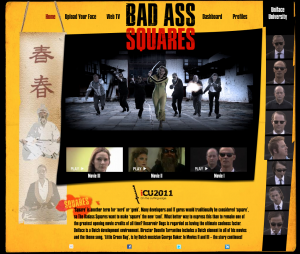I spent a lot more time reading than writing this week, because there were so many great things to read, while trying to avoid the #lessambitiousfilms meme.
Well, I didn’t completely resist with the Animatrix. I was thinking Godfather Part 3 might be another ironic version of the meme (where the name of the movie itself is a less-ambitious version of another movie).
Anyway, about that reading… Aim for a lifestyle, not a jackpot. Of course, my definition of lifestyle is working more on the things I love, but I digress.
Could connect be Microsoft’s iPod. It’s really strange to think of Microsoft as the underdog, hoping to get a halo effect from tech unrelated to Windows or Office.
Plex App, a better media center for Mac OS X and iOS than iTunes? More immediately interesting to me than the Mac App Store.
Quora got a lot of buzz. The reasons given really aren’t about why Quora is a great service, but about trends indicating it might be gaining popularity. I see it as being like WikiPedia, but without the formality and limitations on what’s worthy, while still being somewhat restrictive in preventing spam. That said, it’s not that interesting, because the site doesn’t support private sharing of answers, or limiting answers to friends. That said, I do think the site has arrived, given the awesome Cwora.com spoof.
Paul Buchelt talks about his first 3 years of angel investing, including strategy to: 1) Assume you’ll lose your money, 2) Plan on investing in a large number of companies, and 3) attend YC demo day (he’s now officially involved with YCombinator.
How to make ajax apps crawlable is a nice explanation of why you’re seeing so many URLs on Facebook and Twitter with #! in them.
Dave McClure’s top 10 tech investing trends for 2011: Disagree with #1 (group deals, still lots of opportunities like Kupoz), agree with #2 (location services), agree with #3 (crowdsourcing, which I think is actually how #1 succeeds with sales), disagree with #4 (URLs for in real life, I think this trend is further away), disagree with #5 (don’t see the investment opportunity here yet, though I somewhat see the need), agree with #6 (video, mobile devices and video recording are making it easy than ever), agree with #7 (apps, no kidding, though I think native web apps will make a strong come back on mobile devices), agree with #8 (though I think this was true the past five years as well), agree with #9 (though I see tremendous competition here), and disagree with #10 (Facebook, I think the major growth opportunities have passed until they make the platform truly great for app developers; instead, the best opportunity today is Facebook integration on other apps.) On the last point, I’m curious to see if the premise of Facebook hype will fade is valid. Basically the premise is that the jumping the shark moment is when the founders start to sell off their stake in a major way. I hadn’t really thought of this point before, and need to think a bit to see whether I buy this premise or not.
Monopoly as an interview question. It replaces a previous question I enjoyed of how to build a map directions system.
Google will become an AI company. Will it rename itself SkyNet? Seriously though, I think they’ll need acquisitions to make that happen, and really they need to start with a major overhaul or fix to their search algorithms as they are flooded with content spammers. Duck Duck Go might be interesting, though their value proposition is not following your every move, so I think they believe Google already is an AI company.
Without the Stress. I wish this site was around when applying for a UK visa. It looks to be super handy for getting a passport quickly as well. The founders are fun as well.
URL design, explaining how to properly design URLs on a level I haven’t seen previously.
American Civil War turns 150. Interesting discourse on whether the civil war was about slavery or succession from the union, and its impact on us today.
How to be liked instantly gives away my secrets. Seriously though, interesting article.
Mozilla rejects native client. I disagree with the author’s point, and agree with Mozilla, as Native Client breaks the open web and disincentives the world to make browsers faster.
Open Cola teaches you how to create your own cola drink. It’s fun to see open source permeating non-software industries.
Minimalism is not an intellectual strategy raises some awesome points, basically that clutter and inspiration lead to great ideas, and all true innovation and inspiration were the result of this, and not an empty desk with just a few devices on your desk.
Cambride University refuses to censor a thesis discussing flaws in chip and pin. Good to see a university defend a student’s thesis that mentions flawed security.
For anyone reading this on Facebook or elsewhere, this post is auto-imported from http://dylanschiemann.com/2011/01/07/avoding-lessambitiousfilms/.

